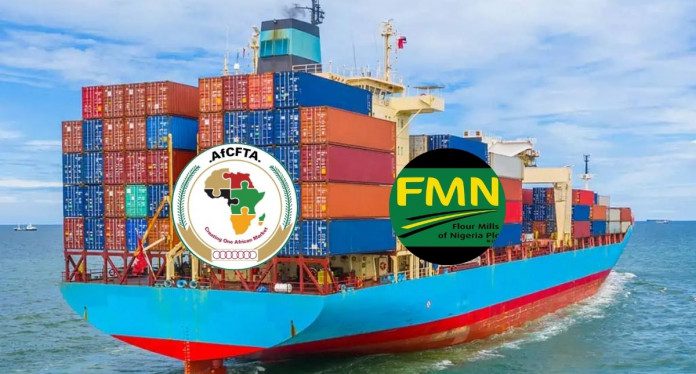News in briefs:
– Flour Mills and eight other Nigerian companies are the first to begin trading under a new free trade agreement for African countries, AfCFTA.
– This inaugural shipment serves as proof to other players that the trading platform is ready and stakeholders can start taking advantage of it.
Flour Mills of Nigeria (FMN) and eight other companies have kick-started intra-African trading under the African Continental Free Trade Area (AfCFTA).
According to a news report by Business Day, the trading officially began on 16 July 2024 with the launch of the Guided Trade Initiative (GTI).
The other companies include Dangote Group, Tolaram, Hwani Industry Nigeria Limited, Le Look Nigeria Limited, Secure ID Limited, Avila Naturalle, Craft Methods Limited and Ruchim Limited.
Flour Mills shipped native starch to Algeria, a country that is heavily reliant on wheat, corn and soybeans imports. However, it has relied on China, France and Italy for most of its needs, as a 2022 trade brief showed.
The idea behind AfCFTA is for African countries to take advantage of the $3.4 trillion combined gross domestic product (GDP) within its borders as opposed to exporting their wealth.
Dangote Group exported clinkers to Cameroon while Tolaram Group sent wrappers to Egypt and Hwani Industry Nigeria Limited shipped water closet sanitary sets to Kenya.
Le Look Nigeria Limited exported bags to Kenya, Secure ID Limited shipped smart cards to Cameroon, Avila Naturalle exported black soap and shea butter to Kenya, Craft Methods Limited sold alcoholic bitters to Uganda, and Ruchim Limited sent SIM and bank cards to Kenya.
The nine exporters had joined their commodities together and shipped them out through the Apapa Port in a significant event.
It is important to note that all the commodities were made in Nigeria and 80% (or more) of the raw materials were sourced locally, in keeping with AfCFTA rules of trade.
Speaking with reporters, Chinwe Ezenwa, who founded Le Look Nigeria Limited, praised the initiative and encouraged more Nigerian companies to get vetted, obtain the Certificate of Origin, and start taking advantage of the free trade area.
Olusegun Awolowo, the executive secretary, National Action Committee on AfCFTA, added that the launch of GTI and Nigeria’s first shipment, will enable stakeholders track the timeframe of shipments.
Leo Ogamba, president of the Shippers Association of Lagos (SAL), added that Nigeria must work to reduce delays at ports, which cause the overall costs of exporting goods to rise. Recall that the African Development Bank (AfDB) is also working on ways to improve ports’ efficiency within the continent to fast track trade.



